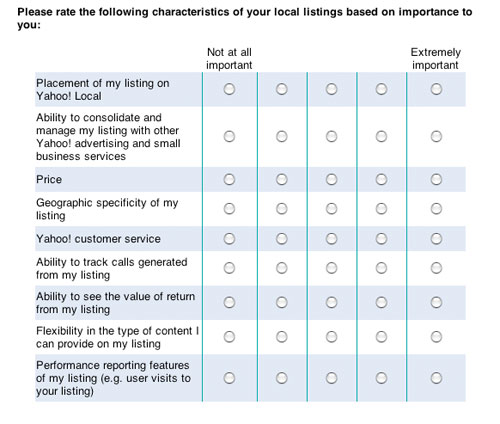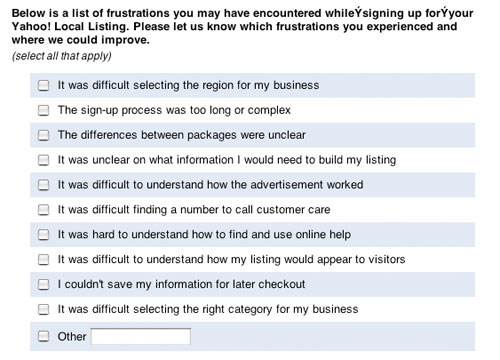Understanding Google My Business & Local Search
Yahoo Local makes me feel good
Many small business people feel embattled, besieged and forgotten. The move toward the “free” business listings of the Internet has removed one monkey from their back – the FUD of the Yellow Pages only to replace it with the inscrutable Google Maps.
Small business people hate standing in line and begging for help ala Google Maps for Business Group. Why isn’t my listing showing? Why can’t I get in the category of my competitor? How come my competitor has the only OneBox on the search results? The questions are asked but not often answered.
At some level Yahoo seems to understand what SMB’s feel better than Google. Last week after I modified a local listing with Yahoo they sent me this email: 
It made me feel good and I dare say would make most small business people feel the same. I knew that the listing was live, I had received an acknowledgment of my effort and they had reached out to me.
I recognize it for what it is: good but automated communications. None the less I felt a certain warm and fuzzy. There was a lesson to be learned here. I even took the time to take the survey and was further impressed. When taking the survey it seemed that they were sincere about wanting to know what I thought and that they did get what it takes to deal with small business folks.
Several of the survey questions impressed me and made me think that they do really get it: 

The survey pages were short and to the point. They are listed at the end if you would like to see each page. The takeaway for me was that Yahoo could make me feel good, without great human to human contact but with great communication. This is a lesson that Google has yet to learn.
While the small business person recognizes that they are not the most profitable link in Google’s profit chain they do want to be recognized and they don’t want to be ignored. The road to long term success in the Local market is to understand that SMB’s are users, customers AND stakeholders. While they may or may not be the key to huge profit they will play a role in keeping the system working and they should not be ignored. They most certainly do not want to be taken for granted.
Google could learn something from Yahoo in this regard.
Yahoo Survey Pages:
© Copyright 2026 - MIKE BLUMENTHAL, ALL RIGHT RESERVED.



Comments
13 Comments
Hi Mike,
I find this to be a really telling article in a way.
What is it that we tell small business owners they must do in order to succeed? Treat their customers well. In the local scene, this will be heavily reflected in the number and tone of the reviews they receive.
Google needs to take a page from this book.
Over the past months, avidly reading your on-going documentation of problems in maps, and seeing bugs and problems of my own, the undertone to it all is that there are disconnects happening at 3 apparent levels:
1) Business owners aren’t aware of Google local and are therefor not controlling their own listings
2) Even when business owners are aware of their local listing and are attempting to keep it updated, these changes can take weeks or months to be reflected in the on-page results.
3) When problems happen, it seems next to impossible to communicate with Google.
Overall, there is a lack of communication between Google and their very important local business owners. If Google truly wants to rule the world as far as local business data is concerned, these disconnects need to be remedied to cut down margins for error and improve relations. When I think of the trouble that traditional YP firms go to in order to meet with and take care of the clients in their book, Google is looking pretty remote.
Great post.
Miriam
Miriam
You are so right. (In fact I think there is a blog post in your response :)).
Just compare the two responses at the end of the listing/correction process between Google and Yahoo:
1)-Google says “awaiting next update”- 6-8 weeks
-Yahoo says you will here from us shortly
2)-Google goes silent
-Yahoo sends and email that confirms the posting
3)-Google expects that you already know how to determine if your listing is there & live (which most smb’s don’t)
-Yahoo sends you a link to actually confirm it
4)-Google makes you go to Groups and forces the SMB to ask questions and suggest alternatives
– Yahoo proactively says tell us what you think, we want your feedback
Which points out how simple and valuable good communication is in the process even if the quality of human interaction isn’t there.
How easily Google could do exactly the same thing. When the record actually goes live just send out a confirming email. It would eliminate a large number of posts to the Group and save Maps Guide Jen time to answer real questions. Just the saving in human time would make the proactive approach worth it to say nothing nothing about repuation management. The amount of ill will avoided would be significant.
Maybe Google needs to hire you and me as SMB ombudspeople! They could use the help. Amazing how for a smart company they can act so stupid sometimes. Why do you think that is so?
Mike
SMB ombudspeople. I love it.
Your 4 points of comparison are completely on-target. Google should really listen to what you are saying about this, Mike.
Why is Google not ‘getting it’ in this area? Here’s a theory…their original business model was geared toward delivering massive data to the masses. The relationship was an impersonal one. No handshakes or kissing babies needed. Just roll out the SERPs and the faceless end user is happy.
That’s not how things work on a local level. Local is all about personal dealings with neighbors. Google is not getting the neighbor part. They are not even getting the aura of ‘your neighborly robot’ that Yahoo is clearly striving for with the efforts you’ve outlined, above.
I know, a few months ago, there was coverage of Google’s effort to hire people to collect local data on foot, but I have no idea what happened with that. Do you?
Here’s the trouble, though. YPs and other local-type advertising ventures invest tremendous sums of money into putting those reps on the street to make contact with local businesses, and they charge vast sums for the ads in their books. Maps is free. It makes me feel weak on cause for complaints about any problems, because it’s free.
But I’m looking at Googles new SERPs with their big new 10 box and am saying, “serious money needs to be put into this if it’s being given top billing by Google. Brainpower and funding need to go into making this the best local directory there is.”
Well, I’m rambling on, but I have a lot of thoughts about this. And, I have been thinking about a blog post, funnily enough. I need a 27 hour day.
Miriam
First off you should not feel “weak on cause”.
All that has happened here is that Google has shifted costs. The data aggregation is done by someone else, the reviews are gathered at the review sites are scraped, the data maintanence is done by the small business person or their proxy. If there is a problem with the data who pays the price (ala the Duke or the Pittsburgh Tech school)?
Google has developed a great algo and uses it to effectively present information. But even there who pays the price when they make a judgement call that affects the particpants (ala Denver Florist)?
Google profits from the data and their ordering of it and has a responsiblity to handle the stake holders with integrity. Just because you haven’t paid for the privelege of being listed doesn’t mean that there aren’t costs both direct and indirect to you or your clients.
While local is about people, in our society it is also about profit. Google has developed a cost effective way to deliver customers to the smb’s and they have profited by having automated that task. They may not being able to dominate all aspects of local with this model but in the end if it is more cost efficient & has shifted more costs and ends up more profitable, they will dominate as capital flows to them and away from higher cost models.
But as you note Google seems blind to the human side of the equation and one really hopes that they figure out how to do better than that. One also hopes that they can get their darn software to work better (sheesh this is starting to sound like another company I know).
Mike
Points taken, Mike. When you look at this from an economic standpoint, it DOES look different. I think I start having trouble seeing the bigger picture because Google’s earnings from their efforts happen through the medium of Adwords. It’s one half-step removed from being paid directly, and I have a habit of putting all of that in one box…the PPC box…and thinking of organic search/local separately. But, of course, it is all revolving around Google’s big plan.
I’m still thinking about how amazing it is that Yahoo had to go to so little effort to make you feel ‘taken care of’, that you’d had communication with them. I feel like that about Barnes & Nobles. Their confirmation emails saying the package is in their warehouse, now it’s been shipped, now it’s heading my way…I really love that. I know it is all automated, but it does act as a voice of consideration coming out of the void that is the Internet.
Interesting subject!
Miriam
Hi Miriam-
Ok so we’ve agreed that the free thing is no excuse for Google to do a poor job of communication. That brings us back to the question of why doesn’t google do a better job of getting the “automated touch” as it were?
Your point about their culture and origins is very to point, and they have apparently applied a lot of their programming talent to the algo as opposed to the process. They are lead by programmers not marketers that is for sure.
Sometimes this appears as hubris (like when they assigned competitors URLs to the wrong local listings: here and here ) but as you point out I think it just blindess to the issues.
Mike
[…] week I received an automated email from Yahoo Local that hit the target for automated communications. It sent me relevant information in a timely fashion about something that I cared about. I was […]
That is super disturbing. Google has made enough great strides in the computer world that one would think that they would be at the height of customer service relations. Hopefully people who use the Yahoo service find it to be as profitable a business endeavor as a properly functioning google listings system would be!
-Steve
@Steve
Not much has changed in the 14 months subsequent. In some ways, things have gotten worse. But as you point out, Yahoo does not generate as much traffic although it still amounts to a sizeable amount.
[…] a year ago I compared Google Maps to Yahoo Local in the nature of their communication upon listing a business in the respective services. I praised […]
[…] to their communications when I list a business with Yahoo, it was a prompt albeit automated response that was friendly and […]
[…] past, posting in the forums was always a crap shoot as to whether they would get an answer and even determining if a listing was in Maps was sometimes problematic. But Google of late has surprised me with a […]
[…] a year ago I compared Google Maps to Yahoo Local in the nature of their communication upon listing a business in the respective services. I praised […]
Comments for this post are closed.